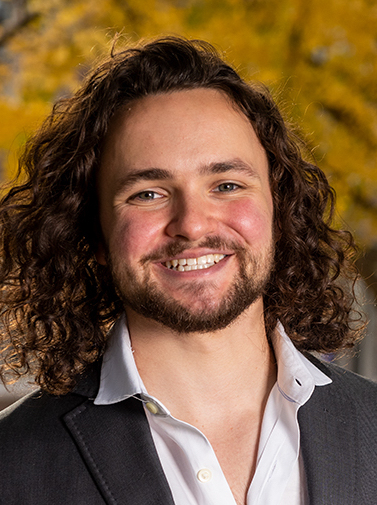Sam Norwitz, 2023 alumnus and recipient of the prestigious Gates Cambridge Scholarship, took Of Dishes, Taste, and Class: History of Food in the Middle East in his senior spring. He shares highlights from his experience in Professor Yücesoy’s classroom.
I was on the waiting list for this class for two years until I finally got a spot my senior spring. And let me tell you… it was well worth the wait!
Of Dishes, Taste, and Class: History of Food in the Middle East more than lived up to its reputation as a fascinating experiential class. In addition to learning about the history of food in the Middle East through primary source cookbooks from the period, we had the opportunity to actually cook those historic recipes ourselves in class. Not only that, Professor Yücesoy brought us to Middle Eastern and Mediterranean restaurants around St. Louis every week for delicious meals and rich conversations with the owners and chefs. It would be an understatement to say this class was unlike any other class I have taken at WashU. The experiential hands-on structure of this class brings the lessons to life and makes learning about the history of food in the Middle East incredibly engaging (and delicious!).

But beyond the thrill of having food in class, Professor Yücesoy fosters a classroom environment that allows each student to shine with their unique backgrounds and experiences. I cannot stress enough that you do not need to have any prior knowledge of Middle Eastern history or culinary experience to thrive in this class. For me, I am a hard-core STEM pre-med student who had never taken a history course at WashU. But Professor Yücesoy encouraged me to let that side of myself shine. He saw that I had a passion for medical science, and encouraged me to use that niche skillset and knowledge base to explore the topic of Middle Eastern food history through my own lens. For instance, I was fascinated by the lessons on humoral theory and Medieval Islamic dietetics, and Professor Yücesoy encouraged me to write my final paper on the implications of using dietetics and humoral theory in Medieval Islamic cuisine as a paradigm for approaching preventative care in modern medicine. Professor Yücesoy even offered to potentially collaborate on publishing a book about how we can apply modern food medicine to examine the health benefits of recipes from Medieval Islamic cookbooks!
While I initially signed up for Of Dishes, Taste, and Class: History of Food in the Middle East as a fun senior elective to expand my appreciation of food, it turned out to be one of the most formative courses I have taken at WashU. Not only did I vastly expand my horizons on Middle Eastern history, I developed a whole new perspective for primary care medicine that I will definitely take into my career as a physician-scientist (who hopes to keep cooking on the side!).
The last thing I will say is that at the end of the semester Professor Yücesoy invited the whole class into his home to have a delicious meal with him and his wife. I think this really epitomizes the generous, kind man Professor Yücesoy is. Beyond the course material, experiences, and lessons, you will have the pleasure of developing a close relationship with a really lovely professor that you can’t get from any other class at WashU.
With that, I strongly encourage all students considering Of Dishes, Taste, and Class: History of Food in the Middle East to take it!